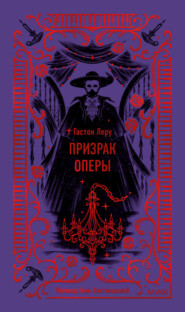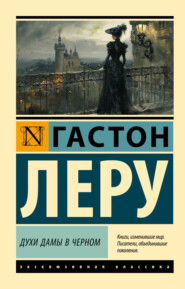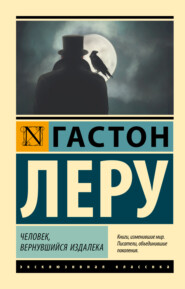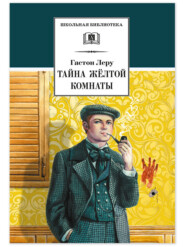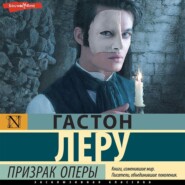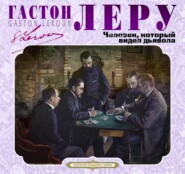По всем вопросам обращайтесь на: info@litportal.ru
(©) 2003-2024.
✖
The Double Life
Автор
Год написания книги
2018
Настройки чтения
Размер шрифта
Высота строк
Поля
“The journalist,” said Théophraste, “was not of the opinion that the calf had decapitated the butcher, and that also was put before Cartouche’s name-that poor Cartouche.” He shrugged his shoulders once more, and then, having raised his eyes above the paper, he sought in the two corners of the dining-room, where M. Lecamus and his wife had taken refuge. They had disappeared. He called them and they did not answer. He tried to open the door of the landing, and it would not open. He then rushed to the chimney, which was large enough for him to get up, and scaled it with the same facility as he had descended the chimney when the boiler was beginning to boil at M. Houdry’s, the same morning that he had decapitated that unfortunate man.
CHAPTER XXVI
Théophraste Again Hears of His Treasures
THE clamber over the roofs of the Rue Ge-rondo on a cold rainy night had a physical and moral effect on Théophraste. He had taken cold and was suffering in consequence. From a moral point of view it had made him change his whole view of these events. While he had been reading the accounts of these crimes with which the new Cartouche had been terrifying Paris, he had shown a callous indifference, but now he commenced to hold himself responsible for many of the atrocities, and especially for the murder of M. Houdry, which he had before facetiously blamed on the calf.
He often recalled nocturnal visits by the route he was now following, and several bloody crimes came back to his memory, disgusting him, and making him weep bitter tears of useless remorse.
It was, however, too late. In spite of all his sufferings, in spite of M. de la Nox’s invocations, and the torture they had submitted him to, Cartouche was not dead.
And that evening, then, like many other criminal evenings, he led his damned soul over the roofs of Paris. He wept. He cursed that mysterious, irresistible force, which from the depths of centuries commanded him to kill. He cursed the influence which made him kill. He thought of his wife-of Adolphe. He bitterly regretted the hours of passed happiness between those two beings so dear to him. He excused them for running away. He pardoned them for their terror. He resolved never again to trouble their peaceful days with his bloody incoherencies. “Let me disappear,” he said to himself. “Let me hide my shame and my original defect in the midst of the desert. They will forget me. I shall forget myself. Let me profit by these logical moments, when my brain, released momentarily from the Other, discusses, weighs, deduces, and concludes and sees in the present.”
It was not Cartouche who spoke, it was Théophraste, who cried to Cartouche: “Let us fly! Since I love Marceline, let us fly! Since I love Adolphe, let us fly! One day they will be happy without me! There is no longer happiness with me! Adieu! adieu! Marceline, adored woman, faithful wife! Farewell, Adolphe, precious, consoling friend! Farewell! Théophraste tells you farewell!” He wept. Then he said aloud: “I come, Cartouche!”
Then he plunged into the darkness, going from gutter to gutter, from roof to roof, sliding from high walls with safety, protected, like a somnambulist, by Providence.
And now who is that man who, with his head lowered, his back curved, his hands in his pockets, swayed like a poor wretch in the wind and rain which fell profusely all the tedious way? He followed the road which skirts the railroad. It is a straight road, bordered by small, weak trees, plain common broom-straw-sad ornaments for a departmental road-running along the side of the railroad. Whence comes this man, with his hands in his pockets, or, rather, this shade of a man? The plain extends to the right and the left without an undulation, without the rising of a hillock, without the hollow of a riser. All this can be seen, for this is not a night scene; it is broad daylight, on the track, straight on by the side of the road.
Trains pass each other from time to time, local trains, fast trains, freight trains, rattling along with an occasional ceasing when one hears in the wind the ting, ting, ting of the bell of the disks at the station. There is one station before, and one behind. They are small stations, and are five kilometers apart. Between the two stations there is a straight double track, but no viaduct, no tunnel, no bridge, not even a culvert.
As I said before, from whence came the sad shade of a man?
It is Théophraste. He has resolved to fly-no matter where-far from his wife.
After a night passed from gutter to gutter, not knowing where to direct his steps, and not caring at all, he goes into a railway station. He gets into a train without a ticket, gets out of the train at another station.
How often does it happen that the control registers of railway stations are badly made on account of the number of travelers.
Behold him, then, on the road at the entrance of a village which follows the railroad track. And who is it that watches him as he crosses the threshold of a little house at the entrance of a village?
Mme. Petito herself!
It was the first time that Mme. Petito had seen M. Longuet since he cut off the ears of her husband. Upon seeing him, Mme. Petito became highly indignant, and commenced upbraiding Théophraste.
After all sorts of imprecations-the result of the barbarity of Théophraste-Mme. Petito informed Théophraste that Signor Petito had found the treasures of the Chopinettes, that he had put them in a safe place, and that the treasures were the richest on earth, treasures which were worth more than two ears. They were as good as the ears of Signor Petito, and so they were quits.
Théophraste, in the course of this discourse, found it difficult to say very much, but this did not disturb him. He was glad of the anger of Mme. Petito, for having furnished him with such valuable information, and he said: “I have found my treasures, for I have found Signor Petito again.”
Mme. Petito burst into satanic laughter.
“Signor Petito,” she exclaimed, “is in the train.”
“In which train?”
“In the train which will pass under your very nose! It will carry my husband beyond the frontier. Get in, then, my dear monsieur; climb in if you wish to speak to him. But hurry, for he passes by in an hour, and they do not distribute tickets at the next station,” and her laugh became more satanic still, so much so that Théophraste almost wished that he was deaf again. He saluted her and walked away rapidly along the railroad track. When he was alone he said: “Come, come! I must get some information about my treasures from Signor Petito himself. But how? He is in the train which will pass under my nose…
CHAPTER XXVII
The Express Train’s Disappearance
IT is necessary now for us to relate the extraordinary events which happened on the railway. At this part of the track, which is double, there were two stations about four miles apart, through which the express trains ran quite frequently. In the evening after Théophraste had been speaking to Mme. Petito, the express train had passed through the first station, and the station master was waiting for the signal from the second station, when suddenly a message came through saying that the train had not arrived yet. The station master could not understand it. The train had passed through his station fifteen minutes before, and would not have taken all that time to go the short distance to the other station. He went out and looked up the track. There was no sign of the train, and all was quiet. Again the signal came back, and the second station master said that he would walk along the track to see if he could find the cause of the delay. The first man said he would do the same, and they both started running down the track, followed by other men in the stations. Although it was broad daylight, nothing could be seen of the train, and the two parties met on the track. The first station master was greatly agitated, and wrung his hands in despair. He knew the train had passed through his station. He was sure of it. The report of his assistant confirmed it. Where could it have disappeared to? The excitement and fear was too much for him, and without any warning he fell dead at their feet with heart failure.
The men ran hither, thither, on both sides of the tracks, but no sign of the train was there. At last they gave up the search, and placing the dead body of the station master on a rough bier of sticks and leaves, they made their way sadly back to the station.
They had not gone far when one of the party cried out: “Look ahead, there’s the train!”
And there, a few yards outside the station, on the very track they had traveled on, was a wagon and baggage car of the disappeared train!
They were all very astonished, and were running, shouting, toward the train, when they suddenly stopped. Peering out of the doors of the train was a peculiar head. It had no ears, and appeared as though the door had been shut violently, catching the man’s neck. They called to him as soon as they saw him, but he did not answer. The head just swayed from one side to the other, rocked by the wind, which was blowing in great gusts. Upon the head was curly hair, and the cravat around the white neck was untied, floating in the wind.
On approaching, they saw the door of the coach was covered with blood, and on examination saw that the man’s head was held to the door by a piece of rag. He had evidently opened the door and poked his head out, when somebody must have shut the door again and decapitated him. The two men who carried the dead body of the station master uttered a cry of dismay, and placing their burden on the track, made an examination of the trucks. They found no one in the first one, and opening the door of the second, found that it was empty save for the dead man’s body, which had been stripped of all its clothing.
The news of this fantastic horror spread rapidly in the villages on the road, and an enormous crowd gathered at the little station.
The police were sent for, but they were unable to get any clue as to who the strange man was, or where the train with all its travelers had gone to.
They were, however, very quiet about it, and only at the inquest did the facts become known.
As it has been said, the tracks between these stations contained no bridge or tunnel, but ran through a flat, desolate country, marked by no hills. The only thing to break the line of the track was a short side line which ran into a disused quarry, which had been used as a sand quarry by a glassmaker. This had been abandoned many years ago, and had not been used since.
On looking at the plan one would at once think that the presence of this branch line was an explanation of the train disaster. But this was not so, as subsequent events will prove. In fact, so simple a solution of the problem would soon have been discovered by the station men.
Wandering along the road which followed the track, Théophraste had noticed the little side track, and he had seen that the switch had been left unlocked. This would have had no significance to him before he had the interview with Mme. Petito, but now he saw an excellent opportunity of getting at Signor Petito, who was on the train. He of course could not get on the train while it was in motion. He would open the switch and wait for the train to come up. The engineer would be sure to see it and stop his train. Here was his opportunity.
This was simple enough, and he did as he intended. He turned the switch, and, going along the track, hid behind the bushes to await the express. He waited and waited for a long time, but no express came. He became impatient, and looked up and down the track, hoping to hear it, or see its smoke.
However, after half an hour, he rose, and, although tired of waiting, went down the track to see what had happened. He had gone about half the distance to the station, when he met a train-fitter who was going along the track to look for the train. Asking him what had become of the train, he turned back up the line, and arriving at the point where he had been hiding, he discovered the baggage car and carriage which were to be found a few minutes later by the trainmen from the station.
In his astonishment he asked how they could have got there without passing him. He had not left the track, so it could not have passed him.
Suddenly he saw the head of a man at the carriage door; the head had no ears, and so he quickly recognized it as that of Signor Petito. He climbed up into the carriage, all excitement, and searching the carriage, suddenly had an idea. He would disguise himself in Signor Petito’s clothes! He quickly undressed, and stripping the dead body of all its clothes put them on, and tied his own up in a bundle. He then descended from the carriage, and fumbling in the pockets of the dead man’s clothes, drew out an old pocketbook. He became feverishly excited as he searched through the papers, seeking some trace of his treasures. But he found nothing, and he found it difficult to hide his disappointment, for Signor Petito had carried the secret of the treasure to the grave.
Mme. Petito was unable to give him any information, for soon after hearing of her husband’s death she became insane, and remained so to the end of her days.
CHAPTER XXVIII
Not To Be Explained!
AS Théophraste was searching through the pocketbook of Signor Petito, he had wandered unconsciously away from the track into the fields. Upon returning, he was astonished to find the carriage had disappeared. He looked up and down the track, but could find no trace of it. Which was the most astonishing, the disappearance or the apparition of the train? He could not make it out, and the events had thrown him into a state bordering on prostration.
He went down the track, examined the switch, and put it back in its original position and locked it, taking the key with him.
He walked on to the upper station, but with the exception of the signalman everybody had gone out in search of the train. He interrogated him, but could only learn that the train had been reported but never came.
Théophraste insisted. “They certainly did report the express to you from the preceding station?”
“Yes, sir. I am certain. Look at my signal. It is still put to allow the train to pass. The station master and all the men of the station preceding saw the express pass and telegraphed to us. In short, monsieur, you see my little yellow arm. A catastrophe between the preceding station and this one is not possible; there is not a single bridge or viaduct. I was mounted on the ladder that you see leaning against that great vat. From there one can see the whole line, as far as the other station. I saw our people gesticulating on the line, but did not see the train.”
CHAPTER XXVI
Théophraste Again Hears of His Treasures
THE clamber over the roofs of the Rue Ge-rondo on a cold rainy night had a physical and moral effect on Théophraste. He had taken cold and was suffering in consequence. From a moral point of view it had made him change his whole view of these events. While he had been reading the accounts of these crimes with which the new Cartouche had been terrifying Paris, he had shown a callous indifference, but now he commenced to hold himself responsible for many of the atrocities, and especially for the murder of M. Houdry, which he had before facetiously blamed on the calf.
He often recalled nocturnal visits by the route he was now following, and several bloody crimes came back to his memory, disgusting him, and making him weep bitter tears of useless remorse.
It was, however, too late. In spite of all his sufferings, in spite of M. de la Nox’s invocations, and the torture they had submitted him to, Cartouche was not dead.
And that evening, then, like many other criminal evenings, he led his damned soul over the roofs of Paris. He wept. He cursed that mysterious, irresistible force, which from the depths of centuries commanded him to kill. He cursed the influence which made him kill. He thought of his wife-of Adolphe. He bitterly regretted the hours of passed happiness between those two beings so dear to him. He excused them for running away. He pardoned them for their terror. He resolved never again to trouble their peaceful days with his bloody incoherencies. “Let me disappear,” he said to himself. “Let me hide my shame and my original defect in the midst of the desert. They will forget me. I shall forget myself. Let me profit by these logical moments, when my brain, released momentarily from the Other, discusses, weighs, deduces, and concludes and sees in the present.”
It was not Cartouche who spoke, it was Théophraste, who cried to Cartouche: “Let us fly! Since I love Marceline, let us fly! Since I love Adolphe, let us fly! One day they will be happy without me! There is no longer happiness with me! Adieu! adieu! Marceline, adored woman, faithful wife! Farewell, Adolphe, precious, consoling friend! Farewell! Théophraste tells you farewell!” He wept. Then he said aloud: “I come, Cartouche!”
Then he plunged into the darkness, going from gutter to gutter, from roof to roof, sliding from high walls with safety, protected, like a somnambulist, by Providence.
And now who is that man who, with his head lowered, his back curved, his hands in his pockets, swayed like a poor wretch in the wind and rain which fell profusely all the tedious way? He followed the road which skirts the railroad. It is a straight road, bordered by small, weak trees, plain common broom-straw-sad ornaments for a departmental road-running along the side of the railroad. Whence comes this man, with his hands in his pockets, or, rather, this shade of a man? The plain extends to the right and the left without an undulation, without the rising of a hillock, without the hollow of a riser. All this can be seen, for this is not a night scene; it is broad daylight, on the track, straight on by the side of the road.
Trains pass each other from time to time, local trains, fast trains, freight trains, rattling along with an occasional ceasing when one hears in the wind the ting, ting, ting of the bell of the disks at the station. There is one station before, and one behind. They are small stations, and are five kilometers apart. Between the two stations there is a straight double track, but no viaduct, no tunnel, no bridge, not even a culvert.
As I said before, from whence came the sad shade of a man?
It is Théophraste. He has resolved to fly-no matter where-far from his wife.
After a night passed from gutter to gutter, not knowing where to direct his steps, and not caring at all, he goes into a railway station. He gets into a train without a ticket, gets out of the train at another station.
How often does it happen that the control registers of railway stations are badly made on account of the number of travelers.
Behold him, then, on the road at the entrance of a village which follows the railroad track. And who is it that watches him as he crosses the threshold of a little house at the entrance of a village?
Mme. Petito herself!
It was the first time that Mme. Petito had seen M. Longuet since he cut off the ears of her husband. Upon seeing him, Mme. Petito became highly indignant, and commenced upbraiding Théophraste.
After all sorts of imprecations-the result of the barbarity of Théophraste-Mme. Petito informed Théophraste that Signor Petito had found the treasures of the Chopinettes, that he had put them in a safe place, and that the treasures were the richest on earth, treasures which were worth more than two ears. They were as good as the ears of Signor Petito, and so they were quits.
Théophraste, in the course of this discourse, found it difficult to say very much, but this did not disturb him. He was glad of the anger of Mme. Petito, for having furnished him with such valuable information, and he said: “I have found my treasures, for I have found Signor Petito again.”
Mme. Petito burst into satanic laughter.
“Signor Petito,” she exclaimed, “is in the train.”
“In which train?”
“In the train which will pass under your very nose! It will carry my husband beyond the frontier. Get in, then, my dear monsieur; climb in if you wish to speak to him. But hurry, for he passes by in an hour, and they do not distribute tickets at the next station,” and her laugh became more satanic still, so much so that Théophraste almost wished that he was deaf again. He saluted her and walked away rapidly along the railroad track. When he was alone he said: “Come, come! I must get some information about my treasures from Signor Petito himself. But how? He is in the train which will pass under my nose…
CHAPTER XXVII
The Express Train’s Disappearance
IT is necessary now for us to relate the extraordinary events which happened on the railway. At this part of the track, which is double, there were two stations about four miles apart, through which the express trains ran quite frequently. In the evening after Théophraste had been speaking to Mme. Petito, the express train had passed through the first station, and the station master was waiting for the signal from the second station, when suddenly a message came through saying that the train had not arrived yet. The station master could not understand it. The train had passed through his station fifteen minutes before, and would not have taken all that time to go the short distance to the other station. He went out and looked up the track. There was no sign of the train, and all was quiet. Again the signal came back, and the second station master said that he would walk along the track to see if he could find the cause of the delay. The first man said he would do the same, and they both started running down the track, followed by other men in the stations. Although it was broad daylight, nothing could be seen of the train, and the two parties met on the track. The first station master was greatly agitated, and wrung his hands in despair. He knew the train had passed through his station. He was sure of it. The report of his assistant confirmed it. Where could it have disappeared to? The excitement and fear was too much for him, and without any warning he fell dead at their feet with heart failure.
The men ran hither, thither, on both sides of the tracks, but no sign of the train was there. At last they gave up the search, and placing the dead body of the station master on a rough bier of sticks and leaves, they made their way sadly back to the station.
They had not gone far when one of the party cried out: “Look ahead, there’s the train!”
And there, a few yards outside the station, on the very track they had traveled on, was a wagon and baggage car of the disappeared train!
They were all very astonished, and were running, shouting, toward the train, when they suddenly stopped. Peering out of the doors of the train was a peculiar head. It had no ears, and appeared as though the door had been shut violently, catching the man’s neck. They called to him as soon as they saw him, but he did not answer. The head just swayed from one side to the other, rocked by the wind, which was blowing in great gusts. Upon the head was curly hair, and the cravat around the white neck was untied, floating in the wind.
On approaching, they saw the door of the coach was covered with blood, and on examination saw that the man’s head was held to the door by a piece of rag. He had evidently opened the door and poked his head out, when somebody must have shut the door again and decapitated him. The two men who carried the dead body of the station master uttered a cry of dismay, and placing their burden on the track, made an examination of the trucks. They found no one in the first one, and opening the door of the second, found that it was empty save for the dead man’s body, which had been stripped of all its clothing.
The news of this fantastic horror spread rapidly in the villages on the road, and an enormous crowd gathered at the little station.
The police were sent for, but they were unable to get any clue as to who the strange man was, or where the train with all its travelers had gone to.
They were, however, very quiet about it, and only at the inquest did the facts become known.
As it has been said, the tracks between these stations contained no bridge or tunnel, but ran through a flat, desolate country, marked by no hills. The only thing to break the line of the track was a short side line which ran into a disused quarry, which had been used as a sand quarry by a glassmaker. This had been abandoned many years ago, and had not been used since.
On looking at the plan one would at once think that the presence of this branch line was an explanation of the train disaster. But this was not so, as subsequent events will prove. In fact, so simple a solution of the problem would soon have been discovered by the station men.
Wandering along the road which followed the track, Théophraste had noticed the little side track, and he had seen that the switch had been left unlocked. This would have had no significance to him before he had the interview with Mme. Petito, but now he saw an excellent opportunity of getting at Signor Petito, who was on the train. He of course could not get on the train while it was in motion. He would open the switch and wait for the train to come up. The engineer would be sure to see it and stop his train. Here was his opportunity.
This was simple enough, and he did as he intended. He turned the switch, and, going along the track, hid behind the bushes to await the express. He waited and waited for a long time, but no express came. He became impatient, and looked up and down the track, hoping to hear it, or see its smoke.
However, after half an hour, he rose, and, although tired of waiting, went down the track to see what had happened. He had gone about half the distance to the station, when he met a train-fitter who was going along the track to look for the train. Asking him what had become of the train, he turned back up the line, and arriving at the point where he had been hiding, he discovered the baggage car and carriage which were to be found a few minutes later by the trainmen from the station.
In his astonishment he asked how they could have got there without passing him. He had not left the track, so it could not have passed him.
Suddenly he saw the head of a man at the carriage door; the head had no ears, and so he quickly recognized it as that of Signor Petito. He climbed up into the carriage, all excitement, and searching the carriage, suddenly had an idea. He would disguise himself in Signor Petito’s clothes! He quickly undressed, and stripping the dead body of all its clothes put them on, and tied his own up in a bundle. He then descended from the carriage, and fumbling in the pockets of the dead man’s clothes, drew out an old pocketbook. He became feverishly excited as he searched through the papers, seeking some trace of his treasures. But he found nothing, and he found it difficult to hide his disappointment, for Signor Petito had carried the secret of the treasure to the grave.
Mme. Petito was unable to give him any information, for soon after hearing of her husband’s death she became insane, and remained so to the end of her days.
CHAPTER XXVIII
Not To Be Explained!
AS Théophraste was searching through the pocketbook of Signor Petito, he had wandered unconsciously away from the track into the fields. Upon returning, he was astonished to find the carriage had disappeared. He looked up and down the track, but could find no trace of it. Which was the most astonishing, the disappearance or the apparition of the train? He could not make it out, and the events had thrown him into a state bordering on prostration.
He went down the track, examined the switch, and put it back in its original position and locked it, taking the key with him.
He walked on to the upper station, but with the exception of the signalman everybody had gone out in search of the train. He interrogated him, but could only learn that the train had been reported but never came.
Théophraste insisted. “They certainly did report the express to you from the preceding station?”
“Yes, sir. I am certain. Look at my signal. It is still put to allow the train to pass. The station master and all the men of the station preceding saw the express pass and telegraphed to us. In short, monsieur, you see my little yellow arm. A catastrophe between the preceding station and this one is not possible; there is not a single bridge or viaduct. I was mounted on the ladder that you see leaning against that great vat. From there one can see the whole line, as far as the other station. I saw our people gesticulating on the line, but did not see the train.”







